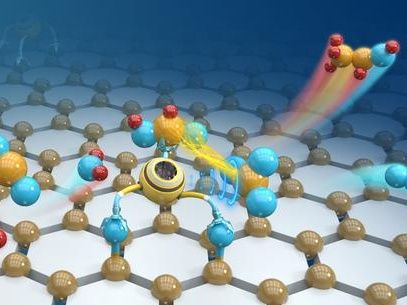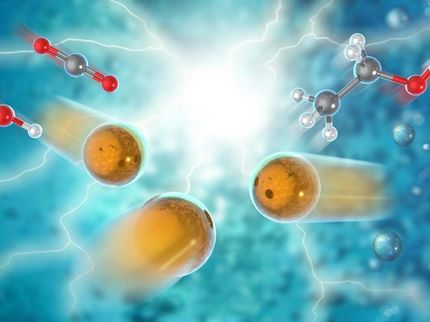Tandem single atom electrocatalyst realizes reduction of CO2 to ethanol
Promising strategy to mitigate carbon dioxide emission
Advertisement
The electrochemical CO2 reduction reaction (CO2RR) into carbon-based fuels provides a promising strategy to mitigate CO2 emission and promotes the utilization of renewable energy.

Tandem single atom electrocatalyst realizes reduction of CO2 to ethanol
DICP
The Cn (n≥2) liquid products are desirable because of their high energy densities and ease of storage. However, manipulation of C-C coupling pathway remains a challenge due to the limited mechanistic understanding.
Recently, a research group led by Profs. ZHANG Tao and HUANG Yanqiang from the Dalian Institute of Chemical Physics (DICP) of the Chinese Academy of Sciences (CAS) has developed a Sn-based tandem electrocatalyst (SnS2@Sn1-O3G), which could reproducibly yield ethanol with a Faradaic efficiency of up to 82.5% at -0.9 VRHE and a geometric current density of 17.8 mA/cm2. The study was published in Nature Energy on Oct. 30.
The researchers fabricated the SnS2@Sn1-O3G through solvothermal reaction of SnBr2 and thiourea on a three-dimensional carbon foam. The electrocatalyst comprised SnS2 nanosheets and atomically dispersed Sn atoms (Sn1-O3G).
Mechanistic study showed that this Sn1-O3G could respectively adsorb *CHO and *CO(OH) intermediates, therefore promoting C-C bond formation through an unprecedented formyl-bicarbonate coupling pathway.
Moreover, by using isotopically labelled reactants, the researchers traced the pathway of C atoms in the final C2 product formed over the catalyst of Sn1-O3G. This analysis suggested that the methyl C in the product comes from formic acid whereas the methylene C was from CO2.
"Our study provides an alternative platform for C–C bond formation for ethanol synthesis and offers a strategy for manipulating CO2 reduction pathways towards desired products," said Prof. HUANG.
Original publication
Other news from the department science
Most read news
More news from our other portals
See the theme worlds for related content
Topic world Synthesis
Chemical synthesis is at the heart of modern chemistry and enables the targeted production of molecules with specific properties. By combining starting materials in defined reaction conditions, chemists can create a wide range of compounds, from simple molecules to complex active ingredients.

Topic world Synthesis
Chemical synthesis is at the heart of modern chemistry and enables the targeted production of molecules with specific properties. By combining starting materials in defined reaction conditions, chemists can create a wide range of compounds, from simple molecules to complex active ingredients.

































































